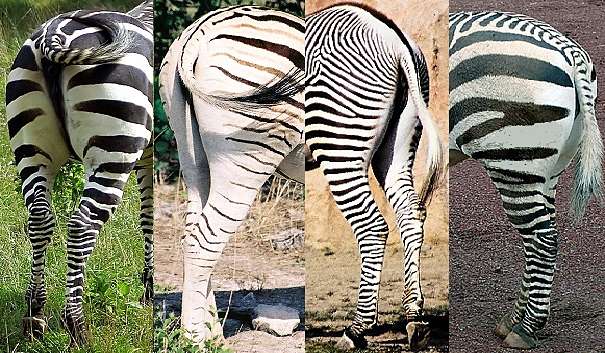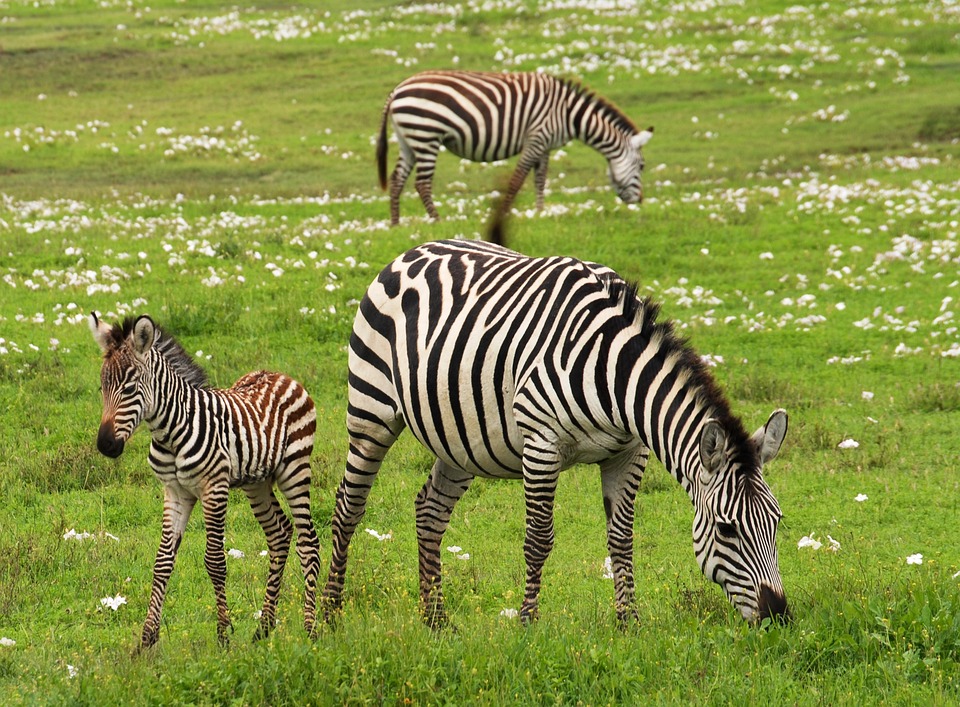Zebra Species Photos
To help clearly identify a particular zebra species on your next safari, I have created an assemblage of photos of the various species (and a few subspecies). Hopefully this will be a good, compact resource for those interested in identifying zebras. If you would like to learn more about zebras as a group and about the subspecies, check out my other, more-detailed post on zebras!
There are three species of Zebra, with several subspecies; the Mountain, Grevy's, and Plains Zebras.
Hartmann's are larger than Cape, and more buff in colour than the whiter stripes of the Cape.
Note the dewlap on males. More obvious on E. z. zebra (Cape) than E. z. hartmannae (Hartmann's).
Thick stripes over body and all the way down the legs, but bare belly except for a ventral stripe as seen in the next photo:
Range:
The above two pictures are likely to be Grants Zebras (E. q. boehmi) as they have the characteristic striped belly of all plains zebras, and their leg striping goes all the way to the hooves. Grants and the rare Selous' (E. q. selousi) are very similar, but Selous' may have "shadow stripes" where Grants rarely, if ever, do. Selous' may appear similar to Burchell's (E. q. berchelli) as well, but Burchell's have sparsely striped lower legs.
Grant butt. Notice the thick stripes, thick dorsal, and some connected spots on the tail.
Burchell's, Chapman's, (E. q. chapmani) and Crawshay's (E. q. crawshayi) have shadow stripes (the thin brown stripes breaking up the white) and Burchell's and Chapman's seem to be the most heavily striped in this fashion. The two shown above are likely Burchell's as this subspecies have the most sparsely striped lower legs of the plains zebras.
Maneless zebra (E. q. brensis). Mares may have a sparse, very short mane, but mature stallions do not.
There are three species of Zebra, with several subspecies; the Mountain, Grevy's, and Plains Zebras.
The Mountain Zebra (Equus zebra) has two subspecies:
- Cape (Equus zebra zebra)
- Hartmann's (Equus zebra hartmannae).
The Grevy's (Equus grevyi) has only the one species.
The Plains (Equus quagga) has 7 subspecies, including the extinct Quagga (Equus quagga quagga)
The other 6 extant (living) subspecies are the:
- Grant's (Equus quagga boehmi)
- Selous' (Equus quagga selousi)
- Burchell's/Damara (Equus quagga berchelli)
- Champman's (Equus quagga chapmani)
- Crawshay's (Equus quagga crawshayi)
- Maneless (Equus quagga brensis)
A very quick ID:
 |
| https://www.animalfactsencyclopedia.com/Zebra-facts.html |
1 = Grants 2 = Burchell's 3 = Grevy's 4 = Mountain
Mountain:
Hartmann's are larger than Cape, and more buff in colour than the whiter stripes of the Cape.
 |
| https://pixabay.com/photos/zebra-head-backlighting-mammal-3758310/ |
Note the dewlap on males. More obvious on E. z. zebra (Cape) than E. z. hartmannae (Hartmann's).
 |
| https://pixabay.com/photos/zebra-baby-baby-animal-zebra-4244667/ |
Thick stripes over body and all the way down the legs, but bare belly except for a ventral stripe as seen in the next photo:
 |
| https://pixabay.com/photos/zebra-hartmann-s-stripes-4979653/ |
 |
| https://pixabay.com/photos/hartmann-s-zebras-mountain-zebras-4892719/ |
Thin bars off the thin dorsal stripe are present on tail
 |
| https://pixabay.com/photos/hartmann-s-zebra-pattern-butt-4493314/ |
Side view of mountain rump.
Range:
 |
| https://www.iucnredlist.org/species/7960/160755590 |
Grevy's:
 |
| https://pixabay.com/photos/zebra-grevy-flock-freedom-savannah-2668655/ |
 |
| https://pixabay.com/photos/grevy-s-zebra-zebra-imperial-zebra-393677/ |
Face is more donkey-like than the other zebra species, mostly due to the large ears. Note white break between muzzle and facial stripes.
 |
| https://pixabay.com/photos/zebra-butt-drawing-animal-272975/ |
Largest ears of any zebra species, bare belly, thin stripes, and thick black dorsal stripe leading down the tail with white on either side.
Range:
 |
| https://www.iucnredlist.org/species/7950/89624491 |
Plains:
 |
| https://pixabay.com/photos/animals-safari-africa-wildlife-4721777/ |
 |
| https://pixabay.com/photos/baby-zebra-safari-serengeti-75885/ |
The above two pictures are likely to be Grants Zebras (E. q. boehmi) as they have the characteristic striped belly of all plains zebras, and their leg striping goes all the way to the hooves. Grants and the rare Selous' (E. q. selousi) are very similar, but Selous' may have "shadow stripes" where Grants rarely, if ever, do. Selous' may appear similar to Burchell's (E. q. berchelli) as well, but Burchell's have sparsely striped lower legs.
 |
| https://pixabay.com/photos/zebra-national-park-lake-nakuru-279977/ |
Grant butt. Notice the thick stripes, thick dorsal, and some connected spots on the tail.
 |
| https://pixabay.com/photos/zebra-zebras-mammal-animal-4406273/ |
Burchell's, Chapman's, (E. q. chapmani) and Crawshay's (E. q. crawshayi) have shadow stripes (the thin brown stripes breaking up the white) and Burchell's and Chapman's seem to be the most heavily striped in this fashion. The two shown above are likely Burchell's as this subspecies have the most sparsely striped lower legs of the plains zebras.
 |
| https://pixabay.com/photos/zebra-butt-eat-black-and-white-zoo-2821113/ |
 |
| By Mark Jordahl - https://www.flickr.com/photos/conservationconcepts/12915343464/in/photolist-kFhvDA-kFhwUG-4jUJDd-6ajr47-3icxqN-3i8Fz6-bdB9u2-bdB3GK-3id157-6J5B7Y-6J5vif-6J5B1s-4yDU3M-6J1vMn-6J5xMh-94UHkt-kFhfhn-rCiTi-3iccyh-8RemCG-8YUQ9w, CC BY 2.0, https://commons.wikimedia.org/w/index.php?curid=33348963 |
Maneless zebra (E. q. brensis). Mares may have a sparse, very short mane, but mature stallions do not.
Range:
 |
| https://www.iucnredlist.org/species/41013/45172424 |

Comments
Post a Comment